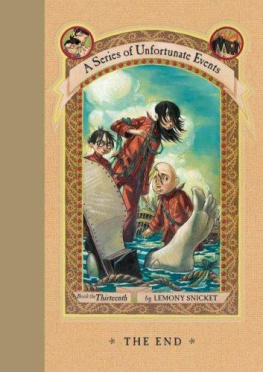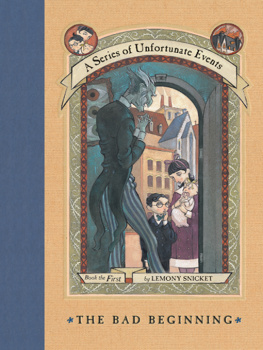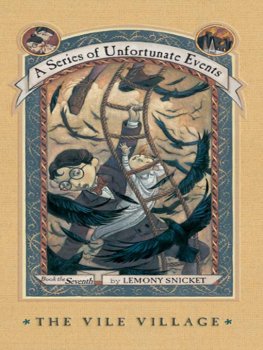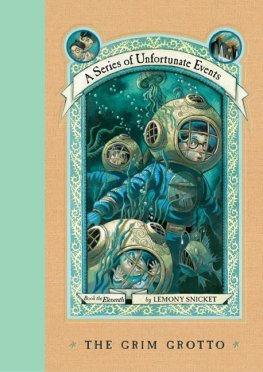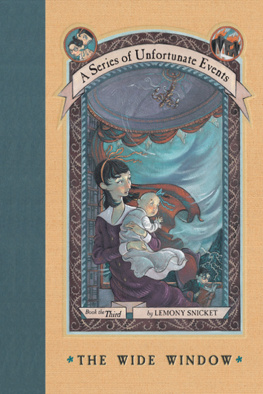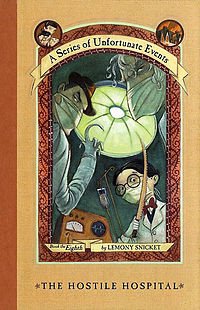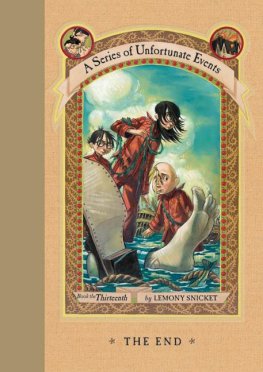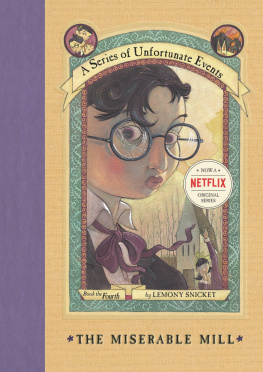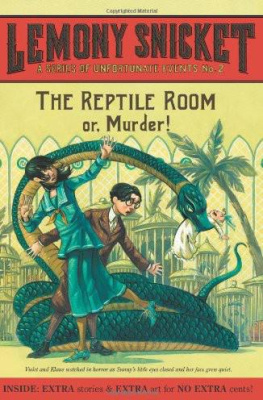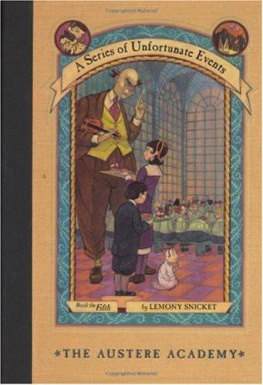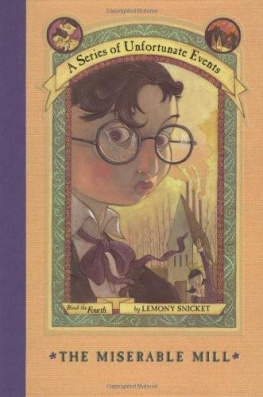
Lemony Snicket
The Reptile Room
The second book in the A Series of Unfortunate Events series, 1999
For Beatrice-
My love for you shall live forever.
You, however, did not.
The stretch of road that leads out of the city, past Hazy Harbor and into the town of Tedia, is perhaps the most unpleasant in the world. It is called Lousy Lane. Lousy Lane runs through fields that are a sickly gray color, in which a handful of scraggly trees produce apples so sour that one only has to look at them to feel ill. Lousy Lane traverses the Grim River, a body of water that is nine-tenths mud and that contains extremely unnerving fish, and it encircles a horseradish factory, so the entire area smells bitter and strong.
I am sorry to tell you that this story begins with the Baudelaire orphans traveling along this most displeasing road, and that from this moment on, the story only gets worse. Of all the people in the world who have miserable lives and, as I'm sure you know, there are quite a few the Baudelaire youngsters take the cake, a phrase which here means that more horrible things have happened to them than just about anybody. Their misfortune began with an enormous fire that destroyed their home and killed both their loving parents, which is enough sadness to last anyone a lifetime, but in the case of these three children it was only the bad beginning. After the fire, the siblings were sent to live with a distant relative named Count Olaf, a terrible and greedy man. The Baudelaire parents had left behind an enormous fortune, which would go to the children when Violet came of age, and Count Olaf was so obsessed with getting his filthy hands on the money that he hatched a devious plan that gives me nightmares to this day. He was caught just in time, but he escaped and vowed to get ahold of the Baudelaire fortune sometime in the future. Violet, Klaus, and Sunny still had nightmares about Count Olaf's shiny, shiny eyes, and about his one scraggly eyebrow, and most of all about the tattoo of an eye he had on his ankle. It seemed like that eye was watching the Baudelaire orphans wherever they went.
So I must tell you that if you have opened this book in the hope of finding out that the children lived happily ever after, you might as well shut it and read something else. Because Violet, Klaus, and Sunny, sitting in a small, cramped car and staring out the windows at Lousy Lane, were heading toward even more misery and woe. The Grim River and the horseradish factory were only the first of a sequence of tragic and unpleasant episodes that bring a frown to my face and a tear to my eye whenever I think about them.
The driver of the car was Mr. Poe, a family friend who worked at a bank and always had a cough. He was in charge of overseeing the orphans' affairs, so it was he who decided that the children would be placed in the care of a distant relative in the country after all the unpleasantness with Count Olaf.
"I'm sorry if you're uncomfortable," Mr. Poe said, coughing into a white handkerchief, "but this new car of mine doesn't fit too many people. We couldn't even fit any of your suitcases. In a week or so I'll drive back here and bring them to you."
"Thank you," said Violet, who at fourteen was the oldest of the Baudelaire children. Anyone who knew Violet well could see that her mind was not really on what Mr. Poe was saying, because her long hair was tied up in a ribbon to keep it out of her eyes. Violet was an inventor, and when she was thinking up inventions she liked to tie her hair up this way. It helped her think clearly about the various gears, wires, and ropes involved in most of her creations.
"After living so long in the city," Mr. Poe continued, "I think you will find the countryside to be a pleasant change. Oh, here is the turn. We're almost there."
"Good," Klaus said quietly. Klaus, like many people on car rides, was very bored, and he was sad not to have a book with him. Klaus loved to read, and at approximately twelve years of age had read more books than many people read in their whole lives. Sometimes he read well into the night, and in the morning could be found fast asleep, with a book in his hand and his glasses still on.
"I think you'll like Dr. Montgomery, too," Mr. Poe said. "He has traveled a great deal, so he has plenty of stories to tell. I've heard his house is filled with things he's brought from all the places he's been."
"Bax!" Sunny shrieked. Sunny, the youngest of the Baudelaire orphans, often talked like this, as infants tend to do. In fact, besides biting things with her four very sharp teeth, speaking in fragments was how Sunny spent most of her time. It was often difficult to tell what she meant to say. At this moment she probably meant something along the lines of "I'm nervous about meeting a new relative." All three children were.
"How exactly is Dr. Montgomery related to us?" Klaus asked.
"Dr. Montgomery is-let me see-your late father's cousin's wife's brother. I think that's right. He's a scientist of some sort, and receives a great deal of money from the government." As a banker, Mr. Poe was always interested in money.
"What should we call him?" Klaus asked.
"You should call him Dr. Montgomery," Mr. Poe replied, "unless he tells you to call him Montgomery. Both his first and last names are Montgomery, so it doesn't really make much difference."
"His name is Montgomery Montgomery?" Klaus said, smiling.
"Yes, and I'm sure he's very sensitive about that, so don't ridicule him," Mr. Poe said, coughing again into his handkerchief. "'Ridicule' means 'tease.'"
Klaus sighed. "I know what 'ridicule' means," he said. He did not add that of course he also knew not to make fun of someone's name. Occasionally, people thought that because the orphans were unforunate, they were also dim-witted.
Violet sighed too, and took the ribbon out of her hair. She had been trying to think up an invention that would block the smell of horseradish from reaching one's nose, but she was too nervous about meeting Dr. Montgomery to focus on it. "Do you know what sort of scientist he is?" she asked. She was thinking Dr. Montgomery might have a laboratory that would be of use to her.
"I'm afraid not," Mr. Poe admitted. "I've been very busy making the arrangements for you three, and I didn't have much time for chitchat. Oh, here's the driveway. We've arrived."
Mr. Poe pulled the car up a steep gravel driveway and toward an enormous stone house. The house had a square front door made of dark wood, with several columns marking the front porch. To each side of the door were lights in the shapes of torches, which were brightly lit even though it was morning. Above the front door, the house had rows and rows of square windows, most of which were open to let in the breeze. But in front of the house was what was truly unusual: a vast, well-kept lawn, dotted with long, thin shrubs in remarkable shapes. As Mr. Poe's car came to a halt, the Baudelaires could see that the shrubs had been trimmed so as to look like snakes. Each hedge was a different kind of serpent, some long, some short, some with their tongues out and some with their mouths open, showing green, fearsome teeth. They were quite eerie, and Violet, Klaus, and Sunny were a bit hesitant about walking beside them on their way up to the house.
Mr. Poe, who led the way, didn't seem to notice the hedges at all, possibly because he was busy coaching the children on how to behave.
"Now, Klaus, don't ask too many questions right away. Violet, what happened to the ribbon in your hair? I thought you looked very distinguished in it. And somebody please make sure Sunny doesn't bite Dr. Montgomery. That wouldn't be a good first impression."
Next page

